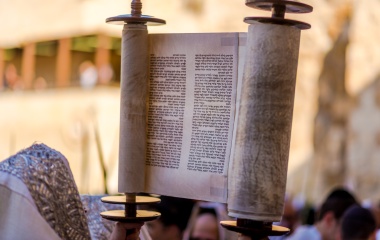
We are meant to observe mitzvot without fanfare, to do so because it is the right thing to do. Mitzvot are cheapened when they are used to display one’s religiosity or for any other personal benefit. Many an action that in theory is most praiseworthy is forbidden in practice because of yuhara, the prohibition of being showy; of religious arrogance or one-upmanship. Great displays of religious fervour should be done in the privacy of one’s home[1], not in the public square.
The Mishna (Brachot 2:8) prohibits a groom from reciting kriat shema on his wedding night. It is not conceivable that his mind would be focused on “accepting the yoke of heaven”. To pretend that he can do so is pure arrogance[2]. This all too often neglected concept pretty much includes publicly following any chumra, religious stringency, which is not widely accepted in whatever circle one finds oneself. Thus, if the rabbi of the shul sits for the repetition of the Amidah or for kriat haTorah it would be forbidden for anyone davening in that shul to stand. Other activities that might[3] be forbidden due to yuhara[4] would include wearing tefillin all day, a woman wearing a tallit, or even wearing one’s tallit over one’s head[5].
It is instructive that the only trait the Torah used to describe Moshe is humility. We are meant to be a humble people – so much so that our Sages teach that G-d cannot dwell with the arrogant. Together with anger these are the only two traits in which one should not follow the “golden mean” and act as a moderate. Rather one should be an extremist when it comes to humility. “Meod meod, very much, very much be of humble spirit" (Pirkei Avot 4:4).
Yet there are some mitzvot we must do in the most public of ways. “How were the bikkurim taken up [to Jerusalem]? All [the inhabitants of] the cities would assemble… An ox would go in front of them, his horns bedecked with gold and with an olive-crown on its head. The flute would play before them until they would draw close to Jerusalem…The flute would play before them, until they reached the Temple Mount. When they reached the Temple Mount even King Agrippas would take the basket and place it on his shoulder and walk as far as the Temple Court. When he got to the Temple Court, the Levites would sing” (Mishna Bikkurim 3: 2-4). The farmers march to the Temple was one of great pageantry and fanfare.
Of course, when masses of people unite to perform a mitzva there is no longer any yuhara – all are on the same page and no one outdoes the other. The power of many joining together creates additional energy and brings glory to the King, brov am hadrat melech, the King's glory is in a multitude of people
That being said there is a more fundamental reason the Bikkurim is brought in such a public manner. Bikkurim express our gratitude to G-d for even, or shall we say especially, the basics of life. The farmer travels to Jerusalem to say thank you G-d that I have some fruit to eat. For that we make a big deal. There is no place for humility when it comes to hakarat hatov. As the polar opposite of yuhara it indeed should be done in public.
At the same time this great text of gratitude is also said in private, as the core text of the Pesach seder. We express gratitude as a community and as individuals. While the former must be uniform the latter must be personalized. Hence every farmer recites the six verses word for word in Hebrew exactly as recorded in the Torah. At the Pesach seder the text is a springboard for discussion reflection, debate and analysis. Each seder must be different.
The Bikkurim ceremony concludes “Then, you shall rejoice with all the good that the Lord, your G-d, has granted you and your household you, the Levite, and the stranger who is among you”.
The Torah understood that there is a deep connection between gratitude and happiness[6]. Training ourselves to say thank you even for very simple favours is an easy way to bring a smile to someone’s face – and your own.
[1] The Sedei Chemed quotes a most fascinating view, that sees yuhara as a character flaw and hence any activity classified as yuhara would be prohibited even in the privacy of one’s home.
[2] The Tosafists (Brachot 17b s.v. Rav Seesha) note that “nowadays” the law is reversed. By not saying shema on one’s wedding night one implies that all other nights of the year one does have proper intent in the recital of the shema. That, the Tosafists insightfully note, would today be the height of arrogance.
[3] There is some subjectivity in defining yuhara.For someone known to be extra pious these strictures might not apply. At the same time I recall hearing from Rav Herschel Schachter that when he was taught that only a G-d fearing person should have one's tzizit showing for all to see, the examples given were Rav Moshe Feinstein and Rav Soloveitchik. Times have changed!
[4] To the best of my knowledge the Talmud never uses the term yuhara itself, rather it forbids actions because of mechzi k’yuhara, it looks like yuhara. Even if it really isn’t a display of yuhara, if others might interpret it that way, it becomes forbidden. Perception matters.
[5] In the Breuers community of today, following the traditions established by Rav Shimshon Raphael Hirsch, only the Rabbi (and dayanim) are allowed to put their tallit over their heads. Today, where this practice is much more wide-spread it may no longer be a violation of yuhara.
[6] With a quick Google search one can see the scientific research linking gratitude with joy. For example see here and here.



